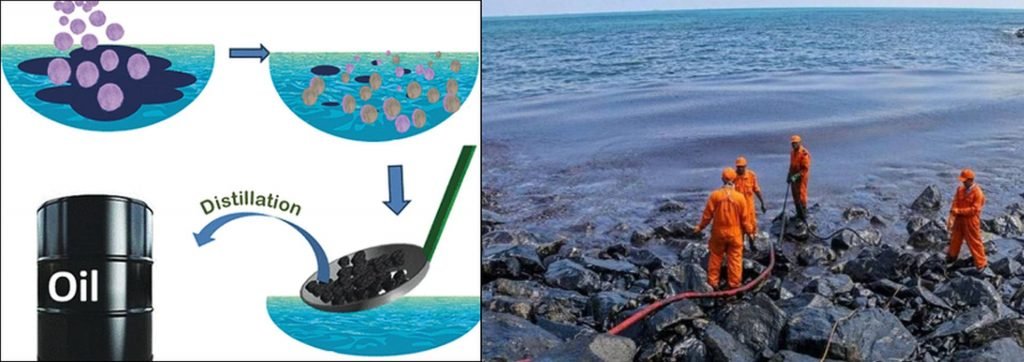Scientists have developed a simple, cheap and environment-friendly system that can effectively remove spilt crude oil from sea that can pollute and even destroy marine ecosystems.
Marine oil spills are disasters that cannot be completely avoided as long as we drill for oil or transport it across the ocean, researchers said. An effective measure would be to remove spilt oil slicks by absorption into a separable solid phase.
Now, scientists from the Indian Institute of Science, Education and Research (IISER) in Thiruvananthapuram, Kerala have found that congelation of the oil to a rigid gel within impregnated cellulose and scooping the particles out is possible.
Kana M Suresan and Annamalai Prathap from IISER have developed and tested an intriguingly simple strategy. Combining absorption and gelation processes, they tightly bound the oil to a porous matrix and then simply scooped the solid particles out of the water.
Even full with the oil, the granules did not sink but remained at the surface.
The scientists also demonstrated that squeezing of the congealed granules can help recover the spilt oil. The scientists chose cellulose as an environment friendly, cheap and porous carrier matrix and impregnated it with a so-called oleogelator, a cheap organic compound.
This simple impregnation step proved to be key in converting the cellulose to an effective oil-absorbing and recycling system. “Phase-selective organogelators are amphiphiles which can congeal oils selectively from a biphasic mixture of oil and water,” the scientists wrote in the journal Angewandte Chemie.
Gelation occurs because the gelator molecules get dissolved in the oily phase, and then they form a three- dimensional fibre network through hydrogen bonding. The oil becomes trapped in this fibrillar network to form a rigid gel. Thus, gelation turns the liquid oil phase into a solid one, which can be simply scooped out.
The other advantage of impregnation is that the gelator renders the cellulose matrix hydrophobic. It did not suck in water as naked cellulose does. However, it “absorbed all the oil, and the rigid globules containing the congealed oil could be scooped out after two hours, leaving the clean water,” the researchers said.
(This article has not been edited by Clean Future and is auto-generated from an agency feed).
